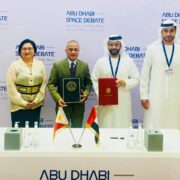The Philippines and the United Arab Emirates reached a historic agreement giving greater protection to Filipino household service workers, the labor department said.
At the conclusion of the two-day Joint Committee Meeting in Manila, it was also agreed that the country will resume deployment of HSWs to the Emirates effective end of the month. Deployment of HSWs to UAE has been suspended since 2014.
Labor Secretary Silvestre Bello III hailed the agreement as a milestone in the government’s efforts to further protect Filipino overseas workers.
Philippine delegation head Undersecretary Claro Arellano said the new deployment will now be covered by a Unified Employment Contract that provides stringent measures to protect Filipino HSWs pursuant to the directives of President Duterte.
The same provisions were in the standard employment contract being used in Kuwait.
Under the unified contract, both the employer and the Foreign Recruitment Agencies, and the Philippine Recruitment Agencies are bound by joint and solidary liability should anything happen to the Filipino workers.
“We are grateful for the cooperation of our counterparts,” Arellano said.
The four-party contract, which becomes addendum to the Memorandum of Understanding on Labor Cooperation with Annex Protocol on Domestic Workers, incorporates the President’s instructions for specific provisions to ensure the safety and well-being of HSWs, as follows:
1. The right of the domestic worker to take at least eight (8) continuous hours of sleep every night;
2. The right of the domestic worker to take a break that is paid, outside the residence of the employer at least one (1) full day every week;
3. The right of the domestic worker to keep his/her passport or identification documents and the employer is not allowed to hold them;
4. The employer shall allow the domestic worker to have and use cellular phones and other communication devices and the employer is prohibited from confiscating them;
5. Opening of bank account under the name of the domestic worker for payment of salary; and
6. Allowing the domestic workers to cook her or his own food.
Another significant achievement in the JCM is the agreement on the conversion of tourist/visit visa to working visa. As agreed during the JCM, POLO will be notified when a visit visa is converted to employment visa for a Filipino domestic worker.
The Philippines reiterated its position to deploy the workers through the legal channel and the conversion of tourist visa to working visa is therefore not recommended since this may lead to illegal recruitment and trafficking in persons.
Meanwhile, the UAE promised to provide a modified Unified Employment Contract that reflects the PH side proposed addendum in the next JCM as well as during the discussion by the Technical Working Group on the electronic system and linkage, both sides agreed that the Addendum will already be implemented for the immediate resumption of the deployment of domestic workers under manual process.
The UAE delegation in the JCM is headed by Saif Ahmed Alsuwaidi, undersecretary of Human Resources and Emiratisation.
—
Stay updated with news and information from DOLE by visiting their website at dole.gov.ph.






